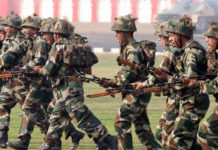TOPIC ‒ A planetary adjustment
Prime Minister Narendra Modi, in perhaps his first address this year on the theme of the environment, remarked that it was not the planet that was “fragile”, but people and their commitment to conserving nature. From James Lovelock’s Gaia hypothesis — that posited the inter-connectedness of nature — to Nobel Laureate Paul Crutzen, who warned that chemical effluents were altering the planet’s atmosphere and causing harmful climate change feedback effects, many have made the case that humanity is in the Anthropocene era and is like a geological force that is shaping the planet’s destiny. However, this gives the distorted sense that it is a vaguely defined ‘planet’ that needs protecting, a notion reinforced by apocalyptic documentaries on melting glaciers. The truth is more complex. Man’s embrace of agriculture, the dominance of wheat and rice as food crops and the clearing of forest tracts caused the first major large-scale changes to global climate though their effects were apparent only over centuries. Atmospheric changes due to the dawn of the Industrial Age and the use of fossil fuels happened, relatively speaking, in a blink of an eye. What is common to both these eras is that those who suffered the most are the poor, or those with the least agency to shield them from a perturbed nature. Last year, Uttarakhand saw an avalanche of rock and ice destroy two hydropower projects and cause deaths. The geology of the Himalayas, scientists have long warned, makes the region inhospitable to large mega-engineering projects and the several foods, landslides and earthquakes over the years have underlined this time and again. But while the earth rearranges itself, it does so in a manner that can be destructive and lethal to those least responsible for causing the disequilibrium. Thus, if “fragile” were to mean a brittleness needing care, then it is people and animals that need protection than a vaguely defined ‘planet’. India’s position of climate justice is that it cannot be denied the right to rely on polluting fossil fuel to ameliorate the living conditions of most Indians who have limited access to reliable energy. Thus, India will continue to “re coal plants, raze forests for industry and build roads in fraught geology — in other words, put the lives of millions of the vulnerable at climate-risk in the pursuit of economic development. India’s commitment to net-zero is set decades into the future at 2070. Unknown unknowns characterize climate science and India, given its size and population, will be disproportionately vulnerable. It must accelerate and priorities the transition to energy sources that are minimally perturbing to the natural balance because — and on this the science is certain — the planet, which may be in a form incomprehensible at present, will long outlast its current residents.
The Hindu Editorial Words with meanings, synonyms, and antonyms
Fragile (adjective) – Vulnerable or easily threatened
Synonyms – Nebulous, perilous, hazy, erroneous, untenable
Antonyms – Flawless, stout, astute, stalwart, robust
Effluents (noun) – Unwanted or unusable material, substances, or by-products
Synonyms – Debris, dregs, rummage, lumber, wreckage
Antonyms – Treasure, consequence, termination, indispensability
Distorted (adjective) – Pulled or twisted out of shape
Synonyms – Warped, contorted, malformed, grotesque, mutilated
Antonyms – Accustomed, commensurable, banal, congruous, stereotypical
Vaguely (adverb) – Loosely, in a general or nonspecific way
Synonyms – Woollily, fuzzily, perfunctorily, inscrutably, abstrusely
Antonyms – Emphatically, patently, univocally, meticulously, overtly
Embrace (verb) – To grip or hold around tightly
Synonyms – Cuddle, embosom, snuggle, nuzzle, throttle
Antonyms –Renounce, rebuff, renounce, spurn, forbid
Perturbed (adjective) – Showing or feeling insecurity or uncertainty
Synonyms – Agitated, fretful, flurried, queasy, ruffled
Antonyms – Limpid, phlegmatic, stolid, sanguine, halcyon
Lethal (adjective) – Very harmful or destructive, and capable of causing death
Synonyms –Noxious, pernicious, baleful, nocuous, venomous
Antonyms –Salubrious, invigorating, anodyne, sanative, felicitous
Brittleness (noun) – The property by virtue of which a material is fractured without appreciable deformation by the application of load
Synonyms –Enervation, asthenia, friability, crumbliness, puniness
Antonyms –Robustness, crudity, hardihood, vigor, solidity
Ameliorate (verb) – To make better, or improve, something perceived to be in a negative condition
Synonyms –Debug, mitigate, hone, recompense, bolster
Antonyms –Stagnate, slump, dwindle, crumble, vitiate
















